By Kostiantyn Moriakov
ANK Law Firm, Odesa, Ukraine
http://ank.odessa.ua/
TOP 5 VESSEL ARRESTS DURING MARTIAL LAW
Since the beginning of the Russia-Ukraine war, maritime business has faced previously unknown and completely new challenges connected with the Russian shipping blockade in the Black Sea. The Danube ports became the main logistical artery for water transport and, accordingly, high-intensity shipping area. Therefore, given the occupation of Mariupol, Berdiansk and Skadovsk ports, and non-operational Mykolaiv and Kherson ports due to continued fighting, all ship arrest court cases migrated to the Odesa region. During this time, the Commercial Court of Odesa Region has considered many interesting cases related to various maritime claims, ranging from typical cargo damage to disputes over ship ownership, which cannot be covered in one article. Therefore, we have prepared our rating of the top five cases on ship arrest during martial law, which is described below for your kind attention.
No. 5: M/V MILA (IMO 8865987, flag of Togo)
Compromise as a way to resolve a conflict
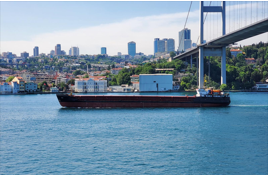
Maritime claim: > USD 696 000
Reason: cargo damage due to the water ingress to the cargo holds
Port: Izmail
Case: № 916/2708/22
In October 2022, the M/V MILA had a voyage from the Turkish port of Haydarpaşa to the seaport of Izmail for the carriage of PET raw materials in big bags for the largest Ukrainian PET packaging manufacturer. During the unloading of the cargo, it was discovered that part of the cargo was damaged due to contact with seawater in the cargo holds.
At the consignee’s request, the vessel was initially detained by the Harbour master with further arrest by the Commercial Court of Odesa Region.
It should be noted that in this case, the shipowner did not hesitate to appoint local lawyers immediately after discovering the damaged cargo and offered all interested parties to conduct a joint survey, and finally entered into negotiations for an amicable settlement.
A constructive approach resulted in a quickly found compromise by the parties and a settlement agreement signed on mutually beneficial terms. The arrest had been cancelled and the Harbourmaster allowed the vessel`s departure.
Peaceful negotiations are the best alternative to lengthy and, in some cases, financially burdensome litigation provided that the parties are able to reach an agreement and, most importantly, are willing to do so.
No. 4: m/v “YASEMIN” (IMO 9136838, flag of Panama)
A deterrent to abuse? Counter security!
Maritime claim: > USD 47 000
Reason: breach of C/P
Port: Mykolaiv
Case: № 915/1550/21
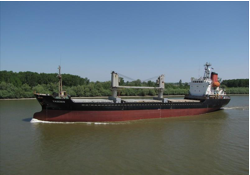
Notwithstanding the beginning of this case in October 2021, the legality of counter-security covered the shipowner’s losses caused by the arrest had been finally resolved during the martial law period, and this is an illustrative case.
According to the case, during a call at the port of Mykolaiv, the m/v YASEMIN was arrested at the request of one of the previous charterers. The maritime claim was based on the fact that there were no legal grounds to pay the demurrage charged by the shipowner for violation of the laytime, which the charterer had paid. Therefore, the charterer demanded a refund of the USD 47 000 paid.
Attempts to release the vessel through negotiations failed due to the ultimatum of the charterer’s representatives.
Taking into account the amount of the maritime claim, the shipowner decided to use the possibility provided by Ukrainian law to replace one security measure with another, namely to deposit USD 47 000 into the court’s deposit account. This is an unconditional ground for the vessel’s arrest cancellation.
After the issuance of the Release Ruling by the court, the charterer’s representatives tried to abuse their rights and pressure the harbour master to extend the detention of the vessel. Instead, the departure was permitted and the vessel moved to the next voyage.
On another hand, the shipowner, who suffered losses due to the vessel’s arrest and its idle time beyond the planned time, after the vessel’s release, filed a motion for counter-security to the Commercial Court of Mykolaiv Region, demanding to oblige the charterer to deposit more than USD 40 000 into the court’s deposit account.
As a result of the court examination, the court sided with the shipowner and satisfied the motion partially, ordering the charterer to deposit more than UAH 778 000, which at the time was equal to about USD 29 000.
The charterer complied with the counter-security order and deposited the funds in the amount determined by the court into its deposit account, but disagreed with the court’s decision and filed an appeal.
In May 2022, the South-Western Commercial Court of Appeal ruled that the court of first instance had lawfully applied counter-security, and therefore the ruling had been left without changes and the charterer’s appeal was dismissed.
It should be noted that all the deposited funds of both the shipowner and the charterer continue to be held in the court’s deposit account, as the substantive dispute between them, which is being considered by the London Maritime Arbitrators’ Association (LMAA), has not yet been resolved.
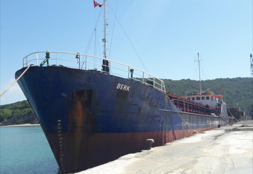
No. 3: m/v “BERK” (IMO 8519942, flag of Togo)
The deposit is a strong argument
Maritime claims: > USD 34 600
Reason: overpaid freight, breach of the contract of carriage of goods
Port: Ust-Danube
Cases: № 916/952/22, 916/1072/22
In this case, the vessel m/v BERK was arrested during a call at the port of Ust-Danube in May 2012 at the maritime claim of the charterer, who demanded a refund of overpaid freight.
The parties were unable to reach an agreement on a peaceful settlement through negotiations, and therefore the shipowner had to decide on the best way to cancel the arrest in order to release the vessel.
Taking into account the amount of the maritime claim, the shipowner decided to deposit the funds into the court’s deposit account and submit a Release Motion.
The Commercial Court of Odesa Region satisfied the Release Motion, as noted above, this is an unconditional ground for the vessel’s arrest cancellation.
During the registration of the vessel’s departure, the charterer’s representatives tried to arrest the vessel repeatedly but motivated their demands referring to a different maritime claim, which, like the first one, arises from the Charter Party.
The shipowner’s representatives notified the court that the vessel had already been arrested at the charterer’s maritime claim, which was cancelled due to the deposit, and therefore there were no legal grounds for a second arrest, as this is expressly prohibited by the 1952 Brussels Convention (see part 3 of Article 3 of the Convention).
Thanks to the efficiency of the maritime agent, the vessel quickly received permission for the departure from the port and left the territorial waters of Ukraine, and therefore the charterer’s representatives were forced to withdraw their repeated Arrest Motion.
The latter two cases show that depositing funds with the court is an indisputable and unconditional argument for the arrest cancellation, which is very helpful in releasing the vessel quickly. Of course, given the usually increased amounts of maritime claims, this option is not always acceptable to shipowners, and in this case, other methods should be used, such as a bank’s LOGU or P&I Club’s LOI. However, the first alternative is complicated and rather time-consuming due to the requirements of the Ukrainian banking system, which requires opening a representative office of a foreign legal entity in Ukraine, while the second alternative requires the consent of the other party, which is rejected in most cases.
No. 2: m/v “MEGA D” (IMO 8206791, flag of Turkey)
Arrest as a tool for abuse
Maritime claims: USD 990 000
Reasons: breach of the vessel sale and purchase agreement, illegal use of the vessel
Port: Izmail
Cases: № 2023/56 E (Turkey); № 916/1596/23; № 916/2137/23; № 916/2551/23; № 916/2613/23; № 916/3229/23; № 916/4925/23; 757/5763/23-k.
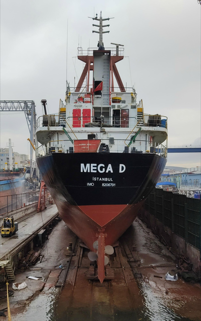
In April 2023, during a call to the port of Izmail, the m/v MEGA D was arrested at the request of a representative of a foreign legal entity on the basis of a maritime claim relating to a breach of the ship sale and purchase agreement.
According to the Arrest Ruling, in order to preserve the arrest’s validity, the applicant then filed a court claim to the Commercial Court of Odesa Region.
After some time, it became known that the foreign legal entity on whose behalf the Arrest Motion was filed had been liquidated in the country of registration since July 2022, and a similar case was considered by the Istanbul Commercial Court. As a result of the proceedings in Turkey, the Arrest Motion was dismissed, and the case against the shipowner was closed due to the Claimant’s liquidation.
The representatives of the shipowner informed the court of the above circumstances, providing duly certified and legalized documents from the Registrar of the Republic of the Marshall Islands and the Turkish court, demanding to refuse to open proceedings against the shipowner and to cancel the vessel’s arrest, which was satisfied by the court.
Additionally, refusing to open the proceedings had been grounded by the court based on the fact that Ukrainian courts have no jurisdiction to examine such disputes. This conclusion was subsequently confirmed by the Supreme Court.
However, the next day after the arrest cancellation, a new Arrest Ruling was “born” at the request of the same representative of the liquidated foreign legal entity, but this time grounded by another maritime claim, namely a dispute between co-owners over the ownership of the vessel, its operation or income from its operation.
The shipowner’s Release Motion, citing the prohibition on re-seizure of a ship under the 1952 Brussels Convention, especially at the request of a person whose legal personality has been terminated, was dismissed by the court.
Meanwhile, in order to preserve the effectiveness of the second arrest, a representative of the liquidated legal entity filed a second claim with the Commercial Court of Odesa Region.
However, it was also returned without consideration, and after appeal proceedings, the second arrest had also been cancelled.
Notwithstanding the above, a few days later, the Commercial Court of Odesa Region arrested the vessel for the third time but then cancelled it on its own due to the applicant’s failure to provide evidence of the claim.
Interestingly, by a “mysterious coincidence”, the court became concerned about the applicant’s fulfilment of its obligation only the day after the fourth arrest was issued by the Pechersk District Court of Kyiv, while the deadline for its enforcement had expired more than a week earlier.
In total, the dispute over the M/V MEGA D resulted in the initiation of 8 cases, 4 of which concerned the arrest of the vessel. As of now, 3 arrests have been cancelled, however, the validity of the last, fourth arrest does not allow the vessel to leave Ukrainian waters.
It is illustrative that the shipowner repeatedly raised the issue of abuse of procedural rights by the representative of the liquidated foreign legal entity before the Ukrainian court, but the court did not pay due attention to it.
Unfortunately, this case is a negative example of what is still allowed in our country:
- Accept applications from any foreign legal entities, even without proof of their good standing (active/normal status);
- Impose an infinite number of arrests on ships on the basis of the same maritime claim (including a contrived one) of the same claimant, despite the prohibition contained in part 3 of Article 3 of the Brussels Convention of 1952;
- Use the repeated arrest of the vessel, even though it was previously cancelled on a similar claim, to “renew” the thirty-day period for filing a claim set out in part 3 of Article 138 of the Commercial Procedural Code of Ukraine, in essence artificially creating the effect of its infinity;
- Abuse of procedural rights with impunity.
I hope that the Ukrainian courts will start to take into account that the arrest of a vessel is one of the most burdensome measures to secure a claim, the losses from which, due to excessive vessel detention, may force the shipowner to satisfy even an unreasonable and illegal claim in order to release the vessel, therefore, more attention will be paid to the justification of such claims, as well as to the issue of the applicant’s good standing (active/normal status) and the need for counter-security, thereby limiting the scope for procedural abuse.
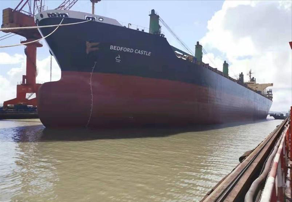
No. 1 TOP Vessel Arrest: m/v “BEDFORD CASTLE” (IMO 9189926, flag of Panama)
Good faith is an unconditional standard of behaviour for the parties
Maritime claim: > USD 870 000
Reason: cargo damage due to the water ingress to the cargo holds
Port: Chornomorsk
Cases: № 916/477/22, 916/548/22
The day before the full-scale invasion, the Commercial Court of Odesa Region arrested the m/v BEDFORD CASTLE at the maritime claim of the consignee, based on cargo damage caused by uncontrolled seawater ingress to the vessel’s cargo holds during a voyage from China to Ukraine.
However, despite the court arrest, on the night of 23-24 February 2022, at 01:15 a.m., i.e. before the aggression against our country, the said vessel which was anchored in the Black Sea port, without authorisation, unanchored and left the port area and the territorial sea of Ukraine, heading for Varna (Bulgaria).
In view of the shipowner’s failure to comply with the Arrest Ruling, the consignee’s representatives demanded before the court to replace the arrest with an obligation to deposit more than USD 871 000 which was equal to the claim amount. Despite the first judicial precedent by the South-Western Commercial Court of Appeal, which in our opinion was absolutely justified and fair, the shipowner’s obligation to deposit funds into the court’s deposit account was not supported by the Supreme Court.
Due to the fact that the existing (de jure) arrest of the vessel, according to Article 3 of the 1952 Brussels Convention, prevented the claimant from demanding a similar arrest in other jurisdictions where the shipowner continued to operate the vessel without interference, the consignee was forced to file arrest cancellation motion, which was satisfied by the court.
It seemed that the Ukrainian court would ignore the fact that the party to the case had failed to comply with a lawful court decision, as the motion for a separate ruling to bring the master of the vessel to justice was also dismissed, which generally set a dangerous precedent and violated the principle of the binding nature of court decisions.
However, at the end of the proceedings, during the examination of the motion on the reimbursement of legal fees, the Commercial Court of Odesa Region took into account the violation committed by the shipowner and dismissed its motion, making a fair conclusion worthy of quotation:
“Compensation of court costs to a person who has deliberately grossly violated the norms of Ukrainian and international law will be clearly unfair and, therefore, contrary to the objectives of commercial proceedings. In addition, the recovery of court costs in favour of such a person will mean that the commercial court, formally exercising its powers to allocate court costs, leaves without a proper response the fact of a party’s failure to comply with a court decision that has entered into force, which is unacceptable, as it will indicate that the court approves of the illegal conduct of the party to the case.”
Nevertheless, this case demonstrates, although not to the fullest extent, that good faith of the parties to the court proceedings is a basic and unconditional standard of conduct. Failure to comply with which should result in appropriate consequences in the form of a proper response by the court, both on its own initiative and at the request of other parties of the case, in order to increase respect for the Ukrainian court and the court’s decisions, as well as to prevent similar dishonest acts in the future.


